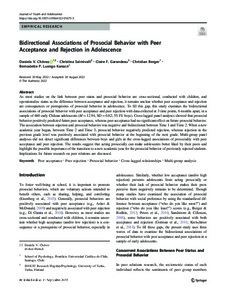Bidirectional Associations of Prosocial Behavior with Peer Acceptance and Rejection in Adolescence
Berger Christian; Chávez Daniela V; Garandeau Claire F; Kanacri Bernadette P. Luengo; Salmivalli Christina
https://urn.fi/URN:NBN:fi-fe2022102463176
Tiivistelmä
As most studies on the link between peer status and prosocial behavior are cross-sectional, conducted with children, and operationalize status as the difference between acceptance and rejection, it remains unclear whether peer acceptance and rejection are consequences or prerequisites of prosocial behavior in adolescence. To fill this gap, this study examines the bidirectional associations of prosocial behavior with peer acceptance and peer rejection with data collected at 3 time points, 6 months apart, in a sample of 660 early Chilean adolescents (M = 12.94, SD = 0.62; 55.1% boys). Cross-lagged panel analyses showed that prosocial behavior positively predicted future peer acceptance, whereas peer acceptance had no significant effect on future prosocial behavior. The association between rejection and prosocial behavior was negative and bidirectional between Time 1 and Time 2. When a new academic year began, between Time 2 and Time 3, prosocial behavior negatively predicted rejection, whereas rejection in the previous grade level was positively associated with prosocial behavior at the beginning of the next grade. Multi-group panel analyses did not detect significant differences between boys and girls in the cross-lagged associations of prosociality with peer acceptance and peer rejection. The results suggest that acting prosocially can make adolescents better liked by their peers and highlight the possible importance of the transition to a new academic year for the prosocial behavior of previously rejected students. Implications for future research on peer relations are discussed.
Kokoelmat
- Rinnakkaistallenteet [19207]
